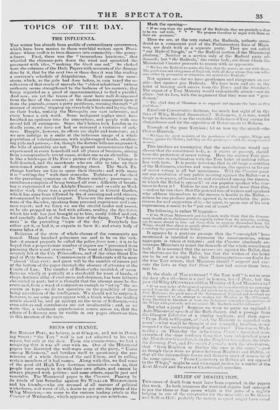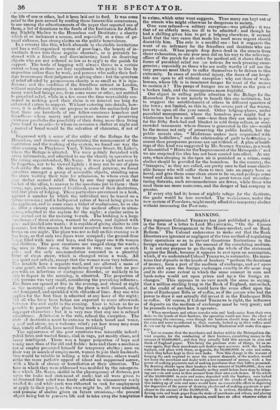RELIEF OF DESTITUTION.
Two cases of death from want have been reported in the papers this week. In both instances the wretched objects had managed to pay the three or four pence which is the price of' a night's !Melte: in one of the receptacles f. e• the miserable in St. Giles's and Saffran Hill : probably the money so spent might have sased
the life of one or other, had it been laid out in food. It was some relief to the pain caused by reading these lamentable occurrences, to see among the advertisements of the paper that reported one of them, a list of donations to the funds of the Institution for Afford- ing Nightly Shelter to the Houseless and Destitute; a charity which at so inclement a season, and especially at a time of ge- neral sickness, has strong chants on the public benevolence.
In a country like this, which abounds in charitable institutions and has a well-organized system of poor-laws, the bounty of in- dividuals flows into these regular channels, or is privately be- etom ed with a friendly and discriminating- hand on deserving objects who are not reduced so low as to arply to the parish for support. The trade of begging will always thrive to a certain extent so long as there are lazy vagabonds who prefer to live by imposition rather than by work, and persons who suffer their feel- ings to overcome their judgment in giving alms : but the quantum of relief aflerded by promiscuous charity is as small as it is inju- dicious; aid the condition of the friendless outcast in London, 'without regular employment, is miserable in the extreme. Too many wretched beings are, from some cause or other, not entitled to parochial relief, while in a few cases the time uuavoidably con- sented in making good their claim is an interval too long for exhausted uature to support. Without entering into details, how- ever, it is sufficient for our purpose to state the melancholy fact that there are hundreds of our fellow-creatures homeless and friendlese---et hose scanty and precarious means of preserving E.xisteneceludes the possibility of their doing more than living ,irom hand to mouth—to whom on occasion a shelter at night and e morsel of bread would be the salvation of character, if not of Impressed with a sense of the utility of the Refuge for the Houseless, and desirous of ascertaining the management of the institution and the working of the system, we found our way the ether evening to Playhouse Yard, Whitecross Street, St. Luke's, where the Refuge is situated. We were politely furnished with every information, and admitted to see the charity in operation by the acting superintendent, Mr. SARD. It was a sight not soon to be forgotten, nor to be viewed lightly : it may not be out of place to describe the scene. On entering a closed gateway, we found euNelves amongst a group of miserable objects, standing upon the straw waiting their turn for admission, to whom even that eour shelter seemed relief. One by one they appeared at the Lliet of the office, to answer to the questions put to them : their eame, age, parish, means of livelihood, cause of their destitution, and last place of lodging. These particulars areentered in a book, a:elitist a number by which the individual may be traced on a inture occasion ; and a half-pound ration of bread being given to Lc epplicant, and in some cases a ticket of readmission, be or she ie after a cursory examination by the medical officer in atten- :Lev°, admitted to the asylum for the night : a similar ration is ii!so sussed out in the morning to each. The building is a large :.arehouse of three stories, warmed by stoves, and lighted with gas: and divided into wards : it is capable of giving shelter to 500 persons; but this season it has never received more than 400 in- reetes on one night. The place was not so full on this evening as it has been, so that only two floors were occupied ; the ground-floor '..eiest. filled with men and boys, and the upper one with women eiel children. The poor creatures are ranged along the wards ; the men in three rows, the women in two; one row on each
: and the only accommodation consisted in a plentiful litter of clean straw, which is changed twice a week. All vas quiet and orderly, except that the women were very talkative. Tie invalids have a separate ward, and are allowed a mess of te arra gruel, with some simple medicine if required : but no per- on with an infectious or contagious disorder, or unlikely to be Lie to depart in the morning, is admitted. The proportion of sish persons was very small, considering the prevailing influenza. The doors are opened at five in the evening, and closed at eight the morning ; and every day the place is well cleaned, aired,
fumigated, and sprinkled with chloride of lime. Any one who .applies for the first time is admitted at any hour of the night ; ont all who have been before are expected to come afterwards t aween the and eight in the evening. Care is taken as far as tosiHe to prevent the place being made a nightly harbour for iwproper characters : but it is very rare that any one is refused athaittance. Admission is the rule, refusal the exception. The state of destitution must be extreme to which bread and water, a reof and straw, are a welcome relief; yet how many may even this, timely affineled, have saved from perishing!
The appearance of the poor creatures was miserable indeed : pallid faces and wasted forms, clad in rags, yet mostly clean, and many intelligent. There was a larger proportion of boys and young men than of the old and feeble: here and there a mechanic Out of employ presented himself for temporary shelter ; men on their way in search of employ meat, women to join their husbands. One would be voluble in telling a tale of distress; others would retake the more patheVe appeal of silent and suppressed sorrow, with a blush of shame or humiliation at their situation. The tune in which they were addressed was modified by the interpreta- lien which Mr. Seen, skilful in the physiognomy of distress, put upon the looks and statement of each ; but all were given to nederstand that telief was freely afforded to whomsoever really teeded it; and while each was exhorted to seek for employment or apply to their pail: le as the ease might be, all were admitted, and proneiee of shelter given on future occasions,—the present object being but to piesteve life and to take away the temptation to crime, which utter want suggests. Thus many are kept out of the streets who might otherwise be dangerous to society. One case refused—a solitary exception—was pitiable : it was that of an elderly man, too ill to be admitted : and though he had a shilling given him to get a lodging elsewhere, it seemed hard that the very cause that made his need more urgent should disentitle him. The rule is a needful one : but it suggests the want of an infirmary for the friendless and destitute who are poverty-sick. When people drop down dead in the streets from sheer exhaustion, as one poor man did on his way to the relieving- officer of the parish for an order for medical aid, it shows that the forms of parochial relief arc oo tedious for such pressing emer- gencies; especially as those tv Ito are really worthy of aid are the very persons most likely to suffer themselves to be driven to this extremity. In cases of accidental injury, the doors of our hospi- tals are open to all without exception : why not those of work- houses, where life is in imminent danger for want of the means to sustain it ? The pangs of hunger are as bitter as the pain of a broken limb, and the consequences more frightful.
Our object in calling public attention to the Refuge for the Houseless Poor is not merely to benefit this one institution, but to suggest the establishment of others in different quarters of the town ; not limited, as this is, to the severe part of the winter, but to be open all the year round. Other lodging-places, under parochial management, where the homeless poor might find a wholesome bed for a small sum—less than they are made to pay for the filthy flock-bed and blanket in cold damp cellars, or over- crowded tenements where disease is generated in the air—would be the means not only of preserving the public health, but the public morals also. " Misfortune makes men acquainted with strange bedfellows," and the relationship of guilt to deetitution is nearer than prosperous persons are apt totbink of. A plan of build- ings of this kind was suggested by Mr. SIDNEY SMIRKE, in a work of his entitled "hints for theimprovement of the Metropolis :" and we are surprised the idea has not been carried into abet. At any rate, when sleeping in the open air is punished as a crime, some shelter should be provided for the houseless. In the country, the "trampers," as they are called, are pretty sure to find some charit- able farmer who will suffer them to turn into an empty barn or hovel, and give them some clean straw to lie on, and perhaps some bread and skim-milk to boot : but in great towns and manufac- turing districts, such accommodations are fewer, while those who need them are more numerous, and the danger of bad company is greater.
If every city bad its house of nightly refuge for the destitute, the gaols would be less crowded. The workhouses, under the new system of Poor-laws, might surely afford this temporary shelter without increasing the Poor-rate.



























 Previous page
Previous page